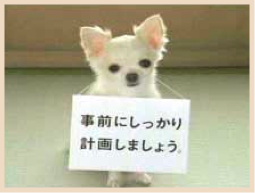
Todd Jay Leonard, Blog


In my last column, I discussed the huge, but welcome, change that has occurred since I came to live in Japan regarding the treatment and care of pets. Twenty years ago, Japanese pets were, for the most part, just things that were considered to be mere possessions; today, pets are coddled and doted over like children, making them an extension of the family unit.
Indulgent pet owners can go overboard, trying to feed their pets food that is best reserved for human consumption. This has led to diseases like obesity, diabetes and heart ailments.
A Japanese friend loved to give her little trio of Dachshunds bites from the table; they especially were fond of cheese. Suddenly, one day the little one was lethargic and unusually low-key.
A quick trip to the veterinarian revealed that the dog's penchant for cheese didn't agree with its system. With the aid of a laxative, the dog was all right in the end, but the doctor scolded my friend and suggested she put all her pets on a strict diet. She spoiled them out of love, but realized it wasn't in their best interest to do so.
In general, Japanese people are influenced greatly by trends and fads which affect their decision-making when purchasing items related to clothing, cars, and even pets. When the movie "101 Dalmatians" first hit the silver screen, a number of people rushed out to buy one of these dogs.
The problem was that as puppies they were cute and cuddly, but they soon grew to be very large dogs requiring a lot of space and care. Apartment living is best suited for smaller canines - not the larger ones.
Also, Dalmatians aren't known for their sweetness toward small children, having a tendency to be nippers if provoked. The end result was that many of these impulsive owners were forced to unload these dogs because of the impracticality of keeping them in a small space with small children.
Another example, which is still currently a trend, is Chihuahuas. A few years ago, a loan commercial aired on TV featuring a long-haired Chihuahua; instantly there was a Chihuahua boom. Pet shops couldn't keep up with the great demand for these animals, so this caused the price of these dogs to skyrocket.
The loan company, after seeing the huge potential of this sudden fad, decided to make this Chihuahua a part of its ongoing advertising campaign. Cleverly, the company continued riding the boom it created by using this dog in a number of different scenarios, one of which featured it married with little Chihuahua puppies all around. People couldn't get enough of this cute little Chihuahua and had to have one.
This isn't too much unlike the U.S. boom that occurred after the airing of the talking Chihuahua dog in the Taco Bell commercials. Similarly, Taco Bell used this interest to market a variety of goods featuring that big-eyed, adorable dog, creating a whole industry around this one character.
Many Japanese pet owners relish owning a unique or unusual type of dog with rare features, making it highly prized. For instance, if the animal has an alternative coat color to what is the norm, or has two different eye colors, or is so small it can fit into a handbag, people clamor to buy these from pet stores.
This is the problem. The demand is outstripping the supply, tempting breeders to produce more dogs more quickly. Unscrupulous dog breeders, trying to make as much money as they can, are breeding parent dogs with offspring and siblings in order to keep up with the high demand. The sad result is that more and more dogs are being born with severe genetic disorders, causing pain and suffering to the dogs and heartbreak to the doting owners.
Some of the genetic diseases are obvious from the time the dogs are born, but others stay hidden until years later when the symptoms suddenly appear, causing the owner to endure an emotional roller coaster, not to mention spending huge amounts of money, trying to cure or care for the animal.
The newly reformed Japanese pet owner will spend any amount of money, like a devoted American pet owner, to save a pet that is like a child or family member.
Very good friends of mine recently learned this lesson the hard way. Their little boy so desperately wanted a pet dog. They agreed that a toy poodle, which is small and doesn't shed hair, would be the best choice. They purchased the dog from a breeder. The dog was perfectly fine for several months, and then one day it had a seizure and died on the way to the veterinarian's office.
Although an autopsy was inconclusive as to the exact cause, it is well-known that one symptom of over-breeding are brittle bones. The dog's skull was fractured and the brain hemorrhaged.
Needless to say, the little boy was crushed. He grieved by making a Buddhist altar for his little dog, arranging her photo and toys around the cremated remains. The entire family was completely heartbroken.
Japanese pet owners sometimes pay anywhere from $8,000 to $10,000 dollars for some of these rare or highly sought after dogs with unusual features.
What isn't clearly understood by these people is that in order to get a Dachshund with white fur (very rare) or a Chihuahua with a bluish coat, the dog, which has a recessive gene, is bred over and over with direct offspring who also will likely have the same recessive gene in order to get that peculiarity.
One puppy with the desired characteristic in a litter may be healthy while all the others are grossly deformed or crippled - no eyes, one paw missing, mentally deficient. But, unethical breeders still feel that selling one for $10,000 is worth the effort, regardless if the majority of the litter has to be put down.
This problem unfortunately is not unique to Japan. Similar cases abound in the United States as well. One difference, however, is the amount of regulations in place to protect animals and pet owners in America from unethical breeders. This, in time, will also be the norm in Japan because the pet boom shows no signs of declining anytime soon, and pet owners will demand changes be made to protect not only them but also the animals at risk.
I currently do not own a pet because of my hectic work and travel schedule. It just wouldn't be fair to the animal. But, if and when I do get a pet, it likely will be a dog, and it will be one that comes to me through rescue or adoption.
Some of the best dogs I have ever known are the ones who are just run-of-the-mill dogs, so mixed that it is impossible to discern clearly which breed is dominant. They are often hearty, healthy, loving and, if rescued or adopted, very appreciative companions.
Please consider going to an animal shelter or to the Humane Society if you are planning to get a pet. There are so many deserving and wonderful animals waiting for just the right owner. If you are already a pet owner, please don't forget to spay or neuter your animals.

By TODD JAY LEONARD
Columnist
Japan's pet problems
Popularity of Chihuahua has increased demand
Monday, February 12 , 2007







